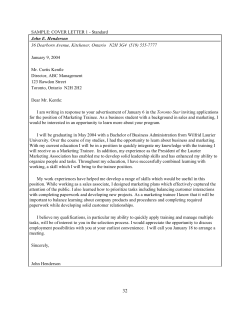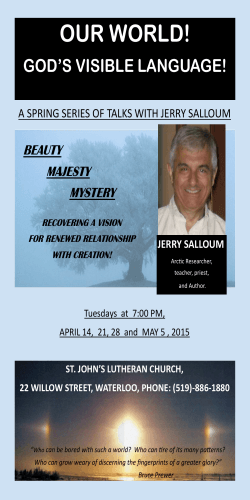
position of Principal-Dean - Evangelical Lutheran Church in Canada
Waterloo Lutheran Seminary Waterloo, ON, Canada Where spirituality accompanies academic curiosity to inspire lives of meaning and service in God’s world Principal-Dean Search 2015 Waterloo Lutheran Seminary Principal-Dean Search The Board of Governors of Waterloo Lutheran Seminary (WLS) announces the search for its next Principal-Dean. The Board seeks a qualified individual who will lead the implementation of the five-year Business Plan which has been crafted and approved by the Board. Our History Waterloo Lutheran Seminary, which is owned by the Eastern Synod of the Evangelical Lutheran Church in Canada, is the founding institution of Wilfrid Laurier University (Laurier), and remains a federated college of Laurier. WLS was founded in 1911 as the Evangelical Lutheran Seminary to provide theological training for pastors to serve Lutheran congregations in Canada. By 1924, the Waterloo College of the Arts was established alongside the Seminary to provide undergraduate liberal arts education. In 1959 Waterloo Lutheran University (WLU), which included the Seminary, was created. WLU continued to focus on the liberal arts, and some professional programs emerged in church music, social work and business. In 1973 the Eastern Canada Synod approved the sale of WLU to the Province of Ontario, and WLS was federated with the newly created Wilfrid Laurier University. WLS became an accredited member of the Association of Theological Schools in 1982. During the 1960s Rev. Dr. Delton Glebe, a pastor, professor and Seminary Principal-Dean, led pioneering initiatives in the field of clinical pastoral counselling, developing programs and contextual learning for this field at WLS. Graduates of our MA and D.Min. programs in Spiritual Care and Psychotherapy will be eligible for membership in the new College of Registered Psychotherapists of Ontario. WLS continues to be an internationally recognized pioneer with its emerging theme of public theology and public ethics. WLS is also a recognized leader in multifaith education and building relationships among and between faith traditions. An undergraduate program in the emerging field of Christian Studies and Global Citizenship has been initiated, and the Senates at Laurier and the Seminary recently approved a PhD in Human Relationships. While the Seminary faithfully continues the important work of training pastors, our work in spiritually integrated psychotherapy, pastoral leadership and global citizenship along with our diverse student population (27 different faith traditions represented) leads us to propose a new name for a new century — Martin Luther University (MLU). The proposed name change is only one part of the five-year Business Plan (2015-2020) which has been designed to guide the next phase of our school’s service in God’s world. The school is on track to undergo a $2.2-million renovation/upgrade of existing facilities in 2016 to accommodate up to 260 students. The Business Plan also calls for potentially doubling the size of the school to accommodate up to 500 students. 2|P a g e Our Vision, Mission and Values Vision for the proposed Martin Luther University Where spirituality accompanies academic curiosity to inspire lives of meaning and service in God’s world. Mission To be a diverse, multifaith and pluralistic community of learning committed to teaching, reflection, and scholarship within the university To cultivate and nurture public leaders whose Christian or spiritual values lead to commitment and service to others and to God’s creation To encourage and challenge individuals in the discovery of their deepest passion and to acquire professional competence for their life’s work To strengthen community and well-being in a holistic way To promote a healthy civil society that values a diversity of opinion and culture Values Excellence in Academic Discipline and Spiritually Integrated Learning Recognizing that the integration of knowledge and skills, faith and spirituality is a lifelong endeavour, we strive to provide formative and integrative educational opportunities for university undergraduate, graduate, and post-graduate students. Integrity in Public Faith and Ethics Rooted in the Lutheran tradition of the Reformation and motivated by the message of God’s boundless grace, we seek to develop leaders with the skills to serve God, neighbour, the community, the church, and creation. Toward this end we: Foster self-awareness and selfinterrogative skills to enable critical thinking; cultivate the skills for recognizing and engaging various “publics,” and for doing public ethics on significant questions and issues; nurture the capacity and confidence to cross the borders of academic, economic, political, social, cultural, or spiritual differences. Hospitality Amidst Diversity Compelled by a vision of God’s inclusive community, we believe that reflecting theologically, cultivating deeper spiritual awareness, nurturing ethical commitments, building character, gaining skills, and developing intellectual disciplines is best undertaken in a diverse yet hospitable community. As a result, we welcome people from any tradition and culture who seek theological education within such a context. Community Engagement Convinced that God works through civil organizations toward the building of a just society, we engage local, national and global communities, subjects, and institutions to more fully 3|P a g e understand the issues of our time and to nurture the capacity of students to provide responsible leadership. Teamwork and the Building of Sustaining Partnerships Persuaded that we are co-workers with God in the healing of creation, we are committed to the building of healthy, collaborative partnerships within the university and the wider community for the purpose of learning with others, optimizing our capacities and identifying opportunities for future collaborative efforts. Highlights of Our Business Plan 2015-2020 In January, the Board of Governors approved the Business Plan for the next five years. It is the result of an extensive visioning process that involved input from all key stakeholders. It contains three primary goals which will comprise the core of the mandate for the new Principal-Dean. Be a place of holistic spiritual well-being within Laurier and wider community Develop a sustainable shared future within Laurier Enhance student engagement through intensifying WLS academic programs Goal One: To be a place of holistic spiritual well-being within the wider community at Laurier and the public. Strategies: 1. Provide spiritually integrated psychotherapy for the Wilfrid Laurier University and Kitchener-Waterloo communities. a. Continue the development of the Delton Glebe Counselling Centre as a teaching and research centre. 2. Invest in and continue the work of the Community Pastor. a. Develop Thirdspace, a community of worship, service and learning for university aged youth and young adults. b. Help students connect with the wider world outside of the university. c. Nurture relationships with youth, congregations and pastors to increase awareness of the school and its programs. 4|P a g e 3. Broaden the impact of MLU in the community by providing opportunities for experiential learning outside of the classroom. a. b. c. d. Continue the work of the Kanata Centre for Worship and Global Song. Build on current interfaith work and the Abrahamic Faiths Forum. Build on and continue the Day of Dialogue. Further develop field trips, retreats and international programs such as “Face to Faith.” e. Further the initiatives of the school’s Centre for Public Ethics. f. Develop a Centre for Leadership. Goal Two: To enhance student engagement and intensify and strengthen core academic programs. Strategies: 1. Intensify enrollments in existing courses through increased promotion and publicity of current undergraduate and graduate course offerings. a. Maximize service learning opportunities within Laurier. b. Collaborate with Laurier Faculties and Departments in cross-listing courses. 2. Increase undergraduate enrollment through programs that attract students who would otherwise not attend Laurier, and provide a “feeder system” for graduate programs. a. Develop undergraduate options in Human Relationships and Mental Health, Public Ethics, and Community Organization Leadership. b. Assess the future possibilities for undergraduate programs in Human Relationships and Mental Health, Public Ethics, and Community Organization Leadership. c. Develop and support active MLU/Laurier undergraduate recruitment initiatives. d. Provide courses on other Laurier campuses (e.g. Brantford, Milton etc.). 3. Increase enrollment in the Master of Divinity (M.Div.) program to ensure a diverse community of learning. a. Develop dual degree programs and specialities. b. Develop an advanced entry program which recognizes previous experience. 4. Sustain and increase graduate program enrollment. 5|P a g e a. Ensure that graduates of the Spiritual Care and Psychotherapy programs meet the requirements for certification by the College of Registered Psychotherapists of Ontario. b. Seek approval of the MA Spiritual Care as an “approved program” with the College of Registered Psychotherapists of Ontario. c. Emphasize the research focus in the PhD program for both students and faculty. d. Develop a Continuing Education Certificate (4 courses) in Human Relationships and Mental Health, Public Ethics, and Community Organization Leadership for professionals. e. Add fields in Public Ethics and Global Citizenship and revise the course requirements for the MA in Theology – Christian Studies. Goal Three: To develop Martin Luther University’s sustainable shared future with Wilfrid Laurier University. Strategies: 1. Increase the public awareness of the school. a. Change the name from “Waterloo Lutheran Seminary” to “Martin Luther University” to better reflect the mission, purpose and focus of the organization. b. Develop and resource a two-way communication program for multiple constituencies: Laurier and other partner institutions; prospective students; current students; alumni; faculty; staff; community; donors and congregations. c. Develop and promote a distinctive brand presence for Martin Luther University. 2. Strengthen the relationship that facilitates greater integration, planning and increased efficiencies between MLU and Laurier. a. Ensure that MLU is uniquely positioned within Laurier to help Laurier meet the requirements of its Strategic Mandate Agreement with the province, and to attract students who would otherwise not attend Laurier (see Appendix I, follow the link below). b. Negotiate a new operating agreement including operations; cross-teaching; library; student services; administrative support; alumni and development; and procedures for reviewing and negotiating academic programs, services and other issues. 3. Develop and implement short-term and long-term plans for the physical assets of MLU. a. Develop a new master plan for Seminary building, including parking. b. Address the deferred maintenance in the current building over a five-year period. 6|P a g e 4. Ensure the long-term financial viability of MLU. a. Develop and resource an institutional advancement program to raise funds for capital and operating costs, and student support. The full text of the Business Plan for the Proposed Martin Luther University is available at: http://legacy.wlu.ca/docsnpubs_detail.php?grp_id=12516&doc_id=61148 The Principal-Dean Reporting to the Chair of the Board of Governors, the Principal-Dean is the chief executive officer of WLS and carries out all administrative matters mandated by the Board. He or she is also a member of faculty and Chair of the WLS Senate which has authority on academic matters. He or she will serve as the chief voice and interpreter of WLS to its constituencies and take leadership in obtaining support for WLS from all possible sources. The key qualifications for this role include: Willingness and demonstrated capability to implement the Business Plan 2015-2020 and potentially to lead the vision for WLS-MLU into the future beyond 2020 An understanding of the history of WLS and its relationship to the Evangelical Lutheran Church in Canada and a commitment to maintaining that relationship Capable of building and maintaining strategic partnerships, especially the strong existing partnership between WLS and Laurier Willingness and demonstrated ability to serve the diverse, multifaith student body at WLS Demonstrated administrative abilities, preferably within an academic institution A passion for teaching and experience as a faculty member at the graduate level Demonstrated ability to inspire others through effective communication with the wisdom and acumen to act as chief spokesperson A willingness to lead in obtaining financial, volunteer and other support for WLS-MLU An advanced degree is required Our Search Process Please submit inquiries, nominations and applications in confidence to seminarysearch@wlu.ca Please include in the application your c.v. and a document outlining how your experience matches the qualifications listed above. References will be requested of those selected for an interview. All applications must be received by Sunday, May 31, 2015. 7|P a g e
© Copyright 2025









